How 101-year-old softball legend Dot Wilkinson found her two great loves in the same place
- Oops!Something went wrong.Please try again later.
Dot Wilkinson had a great arm. She used it to terrorize opponents on the softball field across her 33 years with the Phoenix Ramblers, the team that brought Arizona its first ever sporting title in 1940.
"She was just a very hard nosed catcher," said Carol Spanks, a Hall of Famer who played against Wilkinson for the Orange Lionettes. "She argued lots with umpires. She got thrown out of a lot of games."
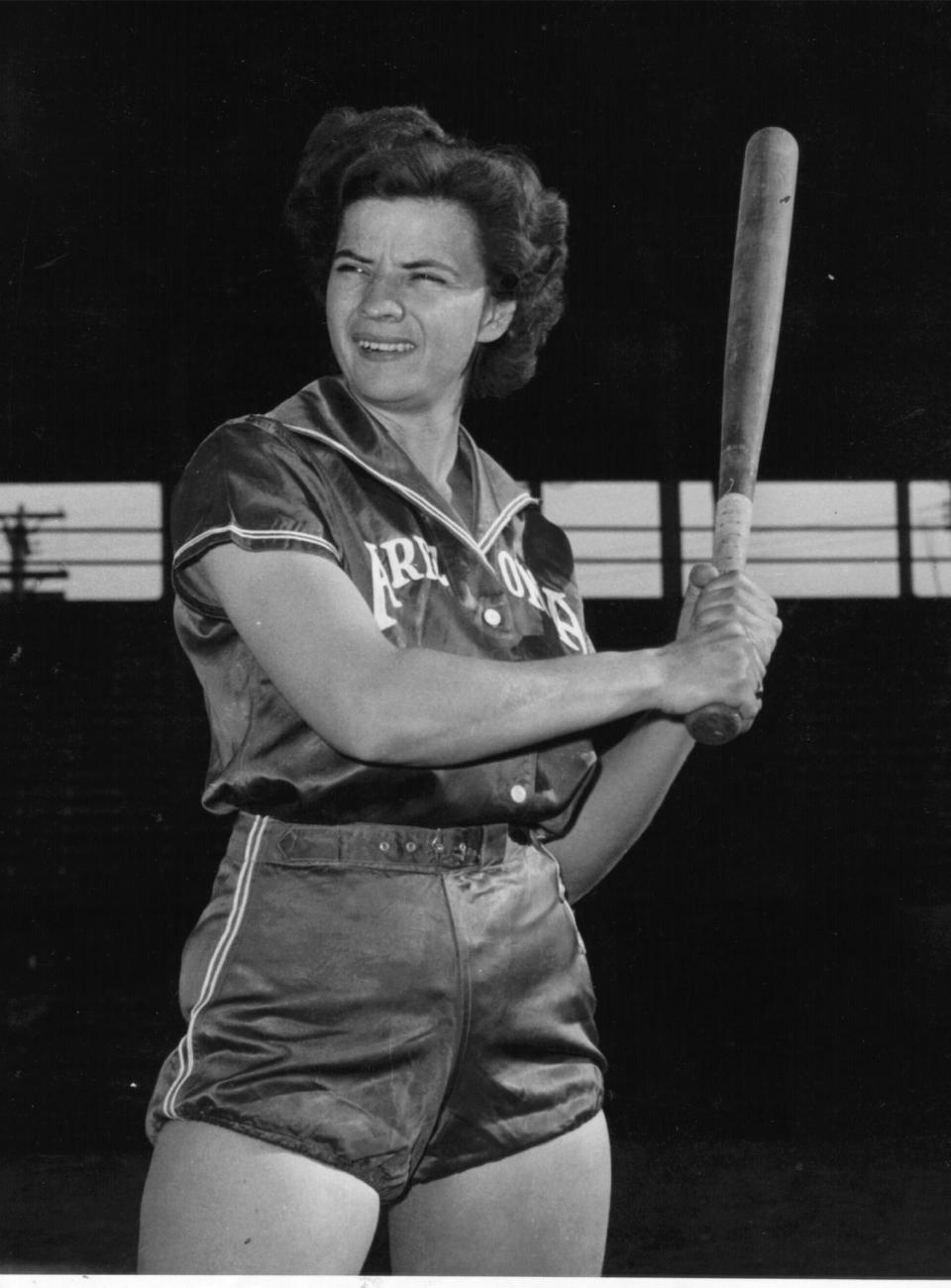
Wilkinson could throw you out at second base without rising from her catcher's crouch, said Bonnie Bryant, who played for the Fresno Rockets before trading softball for professional golf. "You'd better be ready when you go home that you're going to be taken out."
Wilkinson's intense attitude was paired with immense talent, both behind home plate and as a left-handed hitter. In 1960, Sports Illustrated compared her to the legendary Yankees catcher Yogi Berra.
She formed fierce rivalries on the softball field, among them a feud that would turn into the great love of her life.
Other than softball, that is.
But while Wilkinson's extraordinary athleticism made her a Phoenix sporting icon, the era she grew up in meant other parts of her life remained unspoken.
Wilkinson's career — which began in 1933, when she was an 11-year-old living through the Great Depression, and ended in 1965 — coincided with the heyday of women's softball in Phoenix.
In the postwar era, thousands of people turned out in the sweltering summer heat to watch women play ball. It was a different time: fewer rules, rougher games.
That suited Wilkinson fine. When she started out catching, there were no masks or chest plates, just a mitt and sheer courage.
"We played tough like the men do," she told The Arizona Republic in 2001.
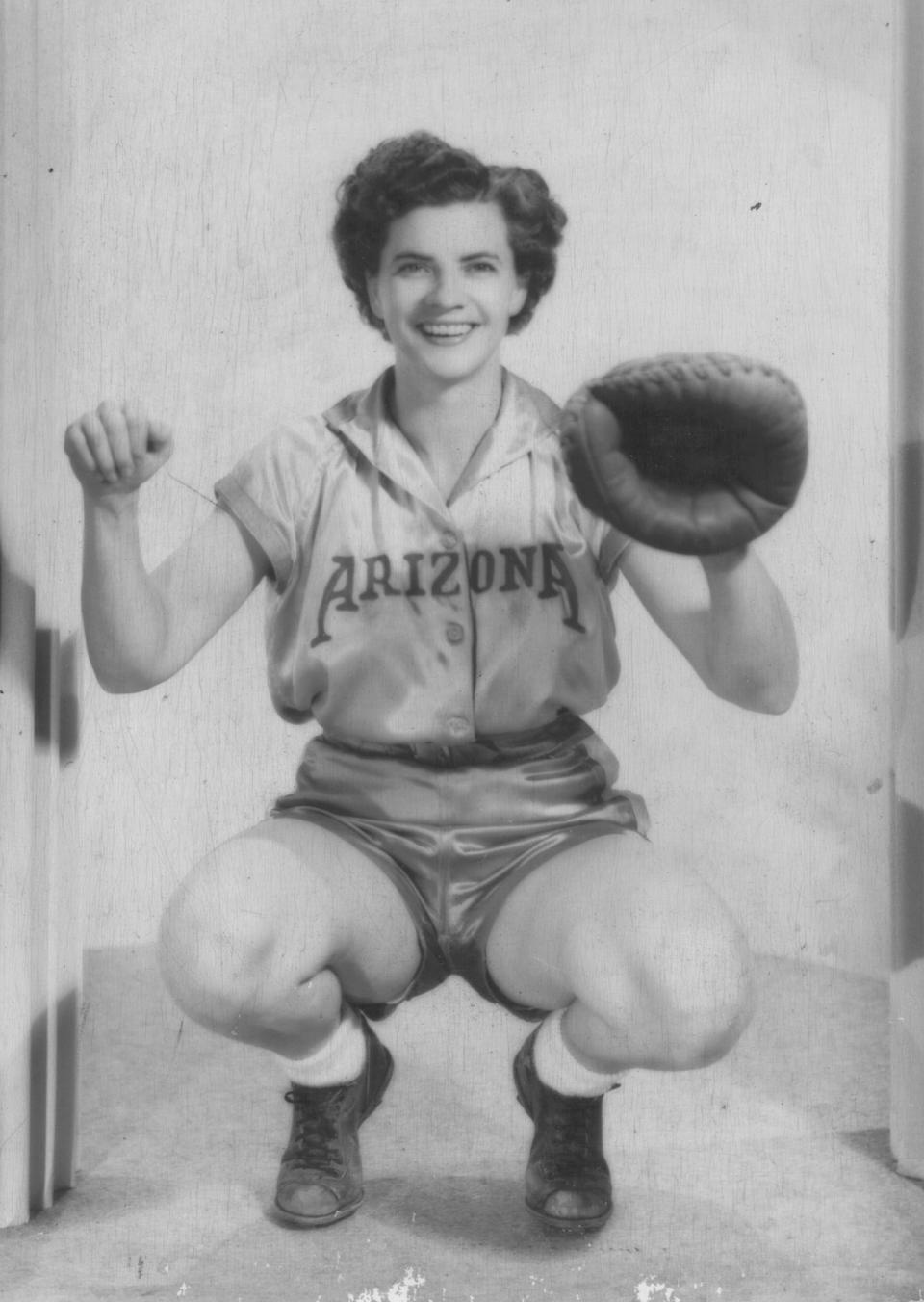
One of the league's fiercest rivalries was between the Ramblers — known officially by the unwieldy name Peterson Brook Steiner and Wist Ramblers, the PBSW Ramblers for short — and the Orange Lionettes. And the enmity was most concentrated between Wilkinson and the California team's second basewoman, Estelle "Ricki" Caito.
They were both fighters who hated losing, a state of affairs that led to a multitude of on-field shenanigans.
"It was like this love-hate relationship," said Lynn Ames, Wilkinson's close friend and biographer. "Ricki and Dot would just get into it on the field and fight and carry on."
"They had a mutual respect for each other, but they were also sort of similar," Spanks remembered. "I always told Ricki she must call up Dot and arrange these things because they happened so often."
In one memorable incident, Wilkinson somehow infuriated Caito as she slid into second base. A short time later, as Wilkinson ran toward third, a boiling mad Caito jumped onto her back.
"Dot was back trying to knock her off, going 'Get off me, get off me!'" said Ames. "She carried Ricki all the way to third base."
Through the years of fierce competition, Wilkinson and Caito got to know each other.
And then in the early '60s, they started dating.
They would stay together 48 years, until Caito died in 2011. In her obituary, Wilkinson would publicly acknowledge their relationship for the first time.
Wilkinson still lives in the South Phoenix home they shared. This month, she turned 101.
From a South Phoenix farm to NYC
Dorothy Elsie Wilkinson was born in South Phoenix on Oct. 9, 1921.
Her British parents had swapped London for Arizona a decade earlier, establishing a farm in what was then an agrarian town of about 30,000 people. Both were athletes, and by some combination of genetics and fate their daughter turned out a sporting prodigy.
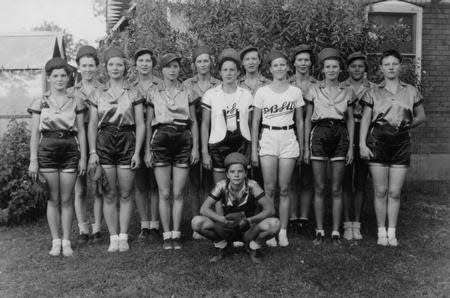
Wilkinson was just 11 when she played her first game for the Phoenix Ramblers in 1933. A team photograph from the 1930s shows her, small and wiry, squatting with her mitt in front of two rows of women dressed in shiny shirts and high-waisted shorts.
Wilkinson's young face says it all: I mean business.
Playing ball was all Wilkinson ever wanted to do, and the game took the Phoenix farm girl to some grand places, fast.
In 1938, the Ramblers played two games at Madison Square Garden. While in New York, they hung out with the Radio City Rockettes on top of the Rockefeller Center.
And in 1940, the Ramblers won the women's amateur national softball championship in Detroit, bringing Arizona — then still the "baby state" — its first ever sporting title. They were welcomed home with a reception at City Hall.
A hidden history
The year before that historic achievement, something else seismic had happened to Wilkinson.
In 1939, she was 18 and about to graduate from high school. She was dating a guy, but the relationship was only making clear what she didn't want. She started spending more time with her girlfriends. And one day, one of her friends kissed her.
That's when she knew, she told Ames.
Wilkinson's life has been documented by Ames in an authorized biography, to be released fall 2023. Wilkinson didn't feel up to speaking directly with The Arizona Republic but was happy for Ames to share stories from her life on her behalf.
The biography will form part of the long-hidden lesbian history of women's softball and baseball. It's a story that has slowly emerged over decades, most recently in the Amazon Prime remake of "A League Of Their Own."
Like the 1992 film, the show is a fictional retelling of the first year of the All-American Girls Professional Baseball League in 1943.
Unlike the film, it portrays lots of lesbian and queer characters.
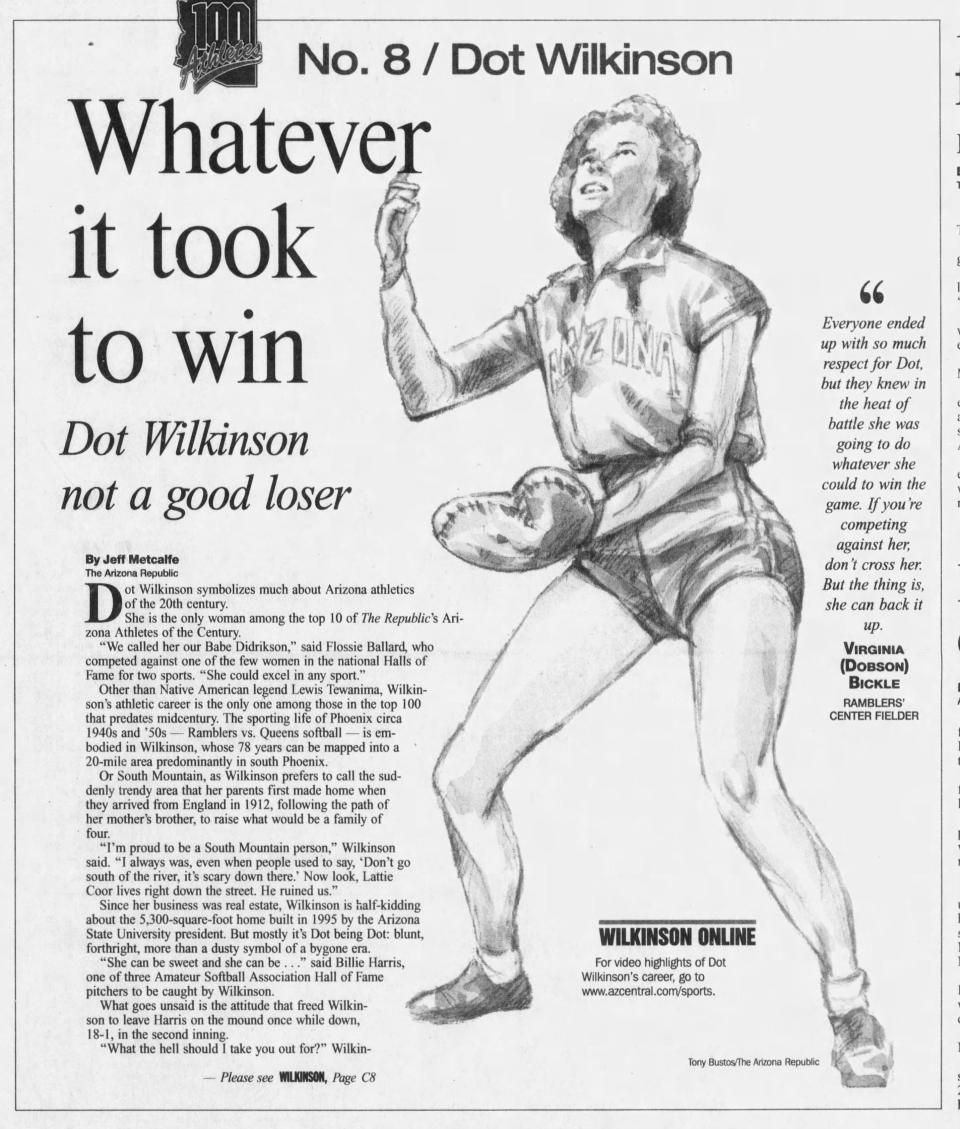
Wilkinson thought the movie was good, but not entirely true, Ames said. It erased the fact a lot of women playing in that league were lesbians.
Wilkinson herself was approached to be part of the league, but turned down the offer of $85 a week to go and play ball in the Midwest.
She didn't like the league's rules, she told Ames. It wasn't the game she knew.
And she didn't like the player requirements to attend charm school, to wear lipstick and skirts on the field, to have a chaperone, all part of assuaging fears that women athletes were not sufficiently feminine.
It wasn't for Wilkinson, who was accustomed to her Levi's, and happy at home in Phoenix.
And in the 1940s, women's softball in Phoenix was huge. Derbies between the Ramblers and the Arizona A1 Queens would draw crowds of thousands, and often erupt into colorful arguments.
The Ramblers won two more national championships, in 1948 and 1949.
It was also in that decade, Wilkinson told Ames, that a lesbian community began to develop, women naturally gravitating to one another in the way gay people do. They would go bowling, or see a movie and get ice cream, or drive up South Mountain and listen to the car radio.
In one scene in the "A League Of Their Own" remake, protagonist Carson Shaw — a catcher, like Wilkinson — finds herself at an underground gay bar. To check her credentials, the incognito bouncer asks: "Are you a friend of Dorothy?" The phrase helped gay people identify each other.
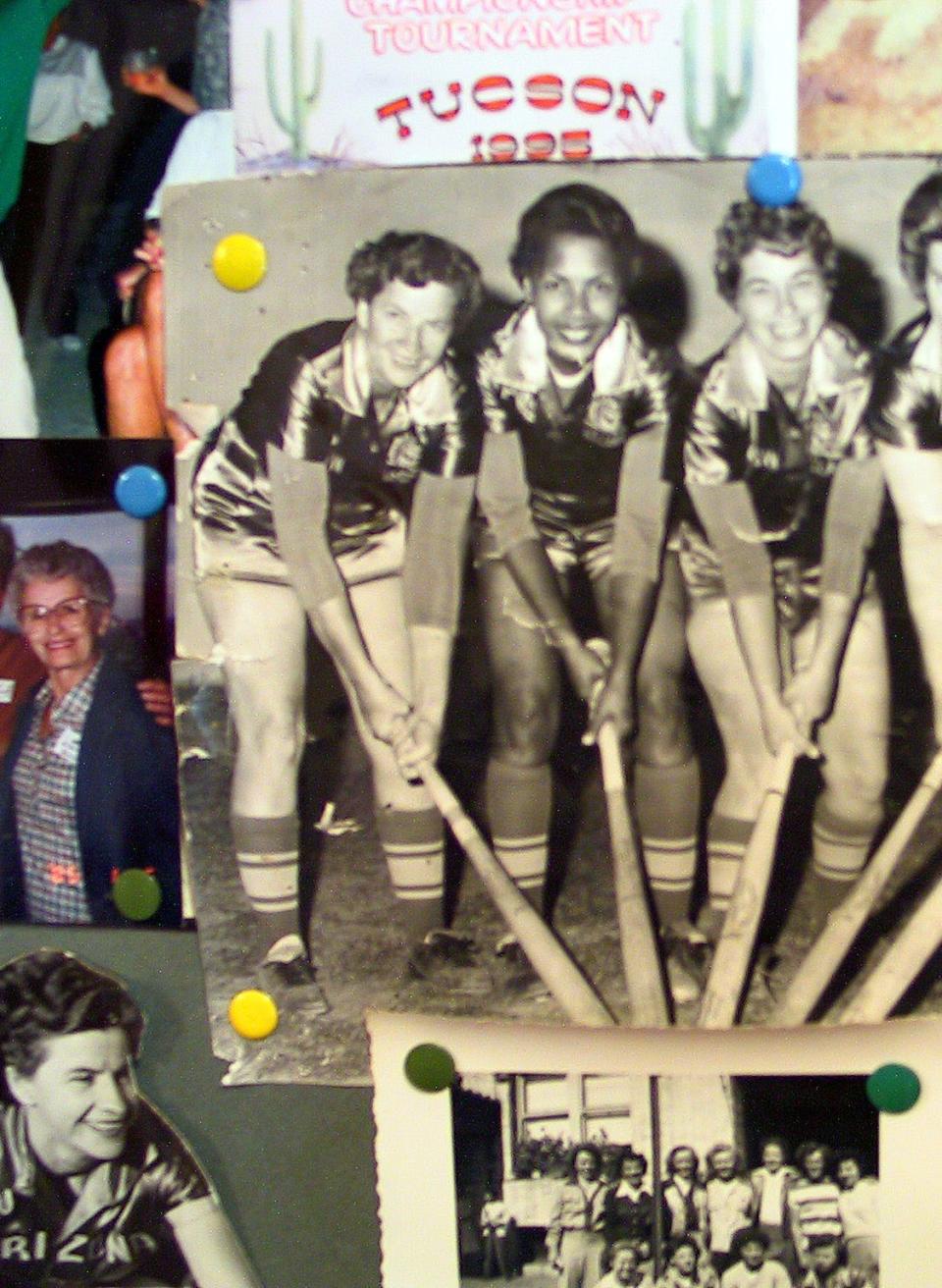
There were similar establishments in Phoenix at the time. Kaye's Happy Landing Buffet, a lesbian-owned bar, opened on Central and Broadway in 1941.
But Wilkinson never went to gay bars. She instructed other Ramblers to steer clear too.
"I told the girls, 'don't ever go to a gay bar,'" Wilkinson said, according to Ames. "Don't ever go to a gay bar because you'll get caught. Don't do that."
They went to straight bars instead and danced together there, for the most part nobody thinking anything of it.
In 1950, Wilkinson and her longtime coach and mentor, Ford Hoffman, built Rambler Field in Phoenix. A clubhouse for players and their guests was added a few years later.
The Ramblers would invite their opponents to come back and socialize, perhaps have a dance, or enjoy leftovers from the snack bar.
It was also a place where the lesbian players could relax and be themselves.
"They made their own space, so that they never had to rely on someone else's space," Ames said. "Which was actually kind of a little bit of genius in 1950."

'It was time to quit'
Throughout the 1940s and '50s, Wilkinson's notoriety as one of the best to ever play only grew. She was a bona fide Arizona sporting legend, her name synonymous with softball in the state.
But interest in the game as a spectator sport peaked in the late 1940s and began a slow decline. It became tough to draw crowds to games. The team's Arizona counterparts, the A1 Queens, disbanded in 1955.
In about 1962, Caito moved to Phoenix to be with Wilkinson. She had taken over the Lionettes, and, in moving, gave up the franchise as well as her California job as a technical illustrator.
Decades on, after Caito died, Wilkinson said to Ames: "I don't understand why she did that."
"I said, 'Dot, because she loved you,'" Ames said. "And she said, 'Yeah, but why would she do that?'"
Wilkinson and Caito played two seasons as teammates before both retiring from softball in 1965.
Their exit was also the end of the road for the Ramblers. Wilkinson had taken over the team by that time and elected to wind it up, citing a dwindling audience and financial issues.
She retired a 19-time All-American.
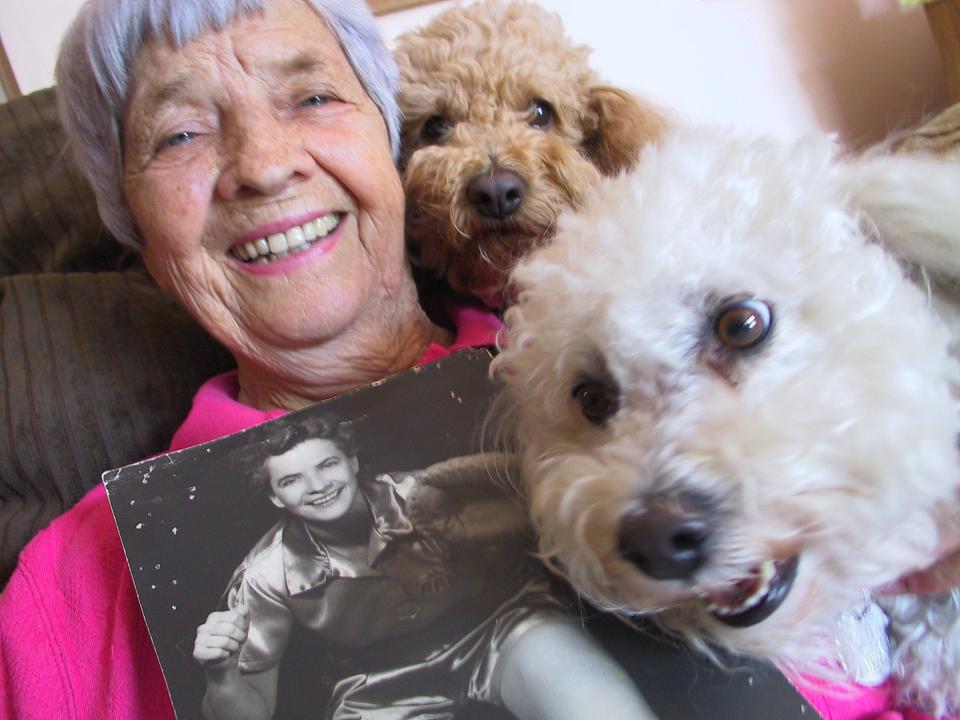
"It was time to quit," she told The Republic in 1965, with typical bluntness. "I'd rather have fans remember me as I was, than watch me decline and say 'I knew her when she was good.'"
She was inducted to the National Softball Hall of Fame in 1970, and became the first woman admitted to the Arizona Sports Hall of Fame in 1975.
Wilkinson was also a champion bowler, and kept competing after hanging up her softball cleats. In 1990, she made the International Bowling Hall of Fame.
In 1999, she was named No. 8 in The Republic's countdown of 100 Arizona Athletes of the Century, the only woman to make the top 10.
Life after softball
After Caito moved to Phoenix, she and Wilkinson made a living flipping houses.
They would buy up dilapidated fixer-uppers and do all the work themselves before selling them for a profit or renting them out.
"They could put glass in the windows, do plumbing, you name it," said Bonnie Bryant, who stayed with them frequently. "I learned a lot from them."
Bryant made the Ladies Professional Golf Association tour after leaving softball, and said Wilkinson and Caito would come and watch her play in Phoenix, or in the Dinah Shore tournament at Palm Springs.
They were endlessly supportive, Bryant said. But Wilkinson was used to raucous softball games, not the more restrained atmosphere of golf.
"They were so loud and I was embarrassed," Bryant remembered. "I went 'Dot, Dot, you've got to keep it down a little.'"
Her longtime companion
Wilkinson never spoke about being a lesbian to her parents, and they never asked.
She and Caito never made a public deal out of their relationship, but it was known and accepted by those who knew them well.
"We were just born at a time when we were all in the closet and that was just the name of the game," Wilkinson said in the 2015 documentary, "Extra Innings."
"And you have to live with it and that's what we did."
In a 1971 article in The Republic, Caito was called "a partner in real estate" to Wilkinson. Thirty years later, a 2001 article described them "roommates".
Like the first "A League Of Their Own," it was true, but not entirely.
When Caito died in January 2011, Wilkinson told Ames: "I'd be damned if I was going to let that woman be buried and not have everybody know what she meant to me."
And so in Caito's obituary she made it clear, albeit in the understated language of their era.
It read: "Ricki is survived by her longtime companion Dot Wilkinson."
101 years in South Phoenix
Wilkinson celebrated a century last year in South Phoenix, where she has spent her life in four different houses.
Her 101st birthday this year was filled with phone calls from her numerous friends, many of them relationships formed over long sweaty days playing softball in the southwest summers.
She still lives for the game.
"Our conversations are always around softball," Spanks said. "Always around softball. It's the biggest part of her life."
Wilkinson ends each day with a call from Ames, a journalist turned author who lives in North Carolina. Ames met Wilkinson in 2010, and began documenting her life, recognizing it as an important piece of history.
Nobody can tell a story like Wilkinson, Ames said.
"Her humor shines through and she's fun and she's funny and she's full of mischief," Ames said. "Back then, she was feared and tough and had, you know, a temper on the field."
"But she was all about the game, you know?" Ames said. "That's all she ever wanted to do."
"And she was great at it. Just great."
Reach the reporter at lane.sainty@arizonarepublic.com. Follow her on Twitter @lanesainty.
This article originally appeared on Arizona Republic: Softball legend Dot Wilkinson found two great loves in the same place

